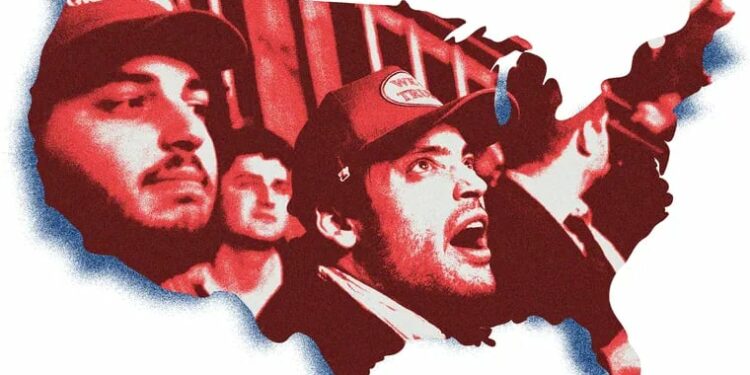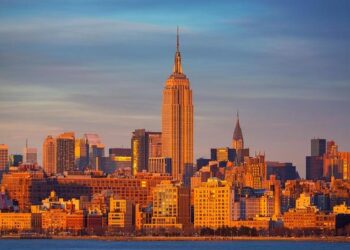On election night at 9 p.m., I left The Inquirer newsroom as results were beginning to spill in, and walked across Center City to the Cherry Street Tavern, where the Philadelphia Young Republicans club was hosting an election watch party. MAGA hats ranging from the subtle (denim and leather) to the in-your-face (red, black, and gold) dotted the heads of those in the crowd. There was a sense — not unlike the Trump rally I reported from in 2020 — of comfort. The subtle gaze exchanged among attendees that asked: You’re one of us? Am I safe to say how I really feel here? And then the relaxing of the shoulders. The open admission of joy.
Early in the night, the young Republicans of Philadelphia were happy but guarded, and overwhelmingly male. When I said I was a journalist, one 20-something guy leered and told me he would only talk if I bought him multiple drinks. There was no line for the women’s bathroom, but in the hallway, I crossed paths with one of the bartenders. “They are all terrible tippers,” she said. We exchanged a knowing glance.
At first, the bar was playing the Flyers-Hurricanes game. Then someone turned on Fox. As the odds for Kamala Harris dwindled, the room reached a crescendo of chants — “U-S-A! U-S-A!” — that I hadn’t heard at quite that volume since Osama bin Laden was killed when I was in college, and a group of mostly boys stormed the quad.
Earlier in the day, a Republican ward leader in Lawncrest called it when he told me Donald Trump would win in a landslide. We didn’t have to wait long to know. No one in Cherry Street Tavern cared what Beyoncé or Oprah or Ricky Martin had to say. They wanted to talk about the economy, about border security, about preventing World War III. “Only Trump can do that,” one 20-year-old partygoer told me.
The celebrity endorsement is dead. Dead, too — for this election cycle at least — is the dream of a female president.
When I left the bar after midnight, the results were clear. I settled into a funk and started questioning everything. How did Harris supporters get this so wrong? And will I ever see a woman elected president?
Later, I called two political scientists to discuss the results.
“When potential voters, prospective voters, are evaluating leadership qualities, they’re doing it through a gendered and raced and classed lens,” Dana Brown, executive director of the Pennsylvania Center for Women and Politics at Chatham University, told me. In other words, a candidate’s gender becomes indistinguishable from her overall identity, even when she tries to downplay its importance.
“I’ll be honest,” Brown added, “when I imagine the first woman president in America — based on understanding the expectations of leadership and masculine traits and feminine traits … most likely that person would have to materialize on the more conservative Republican side.”
And it’s not that Republican women (like Carly Fiorina in 2016 and Nikki Haley in 2024) haven’t tried to make a run for the presidency — they just don’t get very far.
Brown referenced Margaret Thatcher, the conservative British female lawmaker who broke barriers as the first female prime minister in Europe, enacting policies that championed free markets and a small state. Brown also pointed me toward research from 2000 showing that Republican women are more likely than their Democratic counterparts to be elected.
“The fact that we’ve had two failed women candidates on the Democratic ticket in the last eight years,” Brown said, “makes me think that that’s the direction in which voters may be more likely to go.”
Neither of us could imagine a woman with 34 felony convictions running and winning a campaign for the presidency.
Jennie Sweet-Cushman, associate professor of political science at Chatham University, was slightly more optimistic. Harris was “a very credible candidate whose gender didn’t matter in so many ways,” Sweet-Cushman said. “We’re getting to the point where women running for president is a normal thing we expect women to do, and that’s progress. And that’s progress in a relatively short period of time.”
Thirteen states will have female governors next year, a new record high. “We’re absolutely normalizing women in executive roles. And after 200-plus years of it only being men, is it not shocking that it might take a minute?” Sweet-Cushman said.
She sees Harris’ loss through the lens of economics. “The incumbent president during poor economic times loses, hard stop … American politics actually is working the way it always has.”
In times of threat, she added, a “strongman mentality is very alluring.” Trump succeeded in “projecting this more traditional idea of what a man should and does do in society.” It could be a subconscious response on the part of the electorate, but “that energy is very comforting.”
To put it bluntly, Americans love masculinity and fear anything else. (There were small bright spots: Sarah McBride of Delaware was elected as the first out trans member of Congress, and Angela Alsobrooks of Maryland and Lisa Blunt Rochester of Delaware won their Senate seats handily. And for the first time, the Senate will have two Black women serving simultaneously.)
Men: What do you like about Trump? Is it the power, the swag, the illusion of wealth, the braggadocio? I watched The Apprentice as a teen. I understand the allure of being large and in charge. Masculinity means walking into a room and owning it. Masculinity means telling others they are fired. Masculinity means that when you’re wealthy enough, the rules don’t apply.
Femininity means 84 cents on the man’s dollar. Women are stereotyped into the role of caregiver, not leader. Masculinity means power bends in your favor. And if we can’t have power, the next best thing is to be closer to it.
Our country’s slouch to the right is an admission that we want all-American male chauvinism. We want Trump. If Harris were the exact same person but a man — call him Kamal Harris — I think the results would have been a whole lot closer.
There’s something uniquely U.S.-American about this worship. Looking south, Mexico elected its first female president, Claudia Sheinbaum, earlier this year. Nicaragua elected its first female president, Violeta Chamorro, in 1990. Chile elected Michelle Bachelet in 2006. Canada, our neighbor to the north, selected its first female prime minister in Kim Campbell all the way back in 1993.
How much longer will women in the United States have to wait?
When the votes were not yet counted, I had allowed myself to hope. I have always wanted a female president. I recalled the opening lines of Zoe Leonard’s 1992 poem, “I want a president,” about nonbinary poet Eileen Myles’ run for the Oval Office. “I want to know why this isn’t possible,” Leonard asked.
In The Inquirer newsroom, where we ate pizza purchased by our editors while awaiting election results, a colleague wondered out loud if our country was ready for a female president.
The answer is obvious: Not now. Maybe not ever. For women in U.S. politics — especially women on the left — access to the highest office is not a glass ceiling, but a cement coffin.
I hope I’m wrong. Yes, a woman can be vice president. Sure, she can try for more. But men don’t want to lose grasp of the power they have. People who aspire to masculine power don’t want to lose their proximity to power, either.
When there’s a woman at the top of the ticket, I fear she can never win.
Source link : http://www.bing.com/news/apiclick.aspx?ref=FexRss&aid=&tid=6735d45506cc41f8871ae187a169a33d&url=https%3A%2F%2Fwww.inquirer.com%2Fopinion%2Fcommentary%2Ftrump-victory-republican-women-masculinity-gender-20241114.html&c=13085531581414548811&mkt=en-us
Author :
Publish date : 2024-11-13 21:10:00
Copyright for syndicated content belongs to the linked Source.












